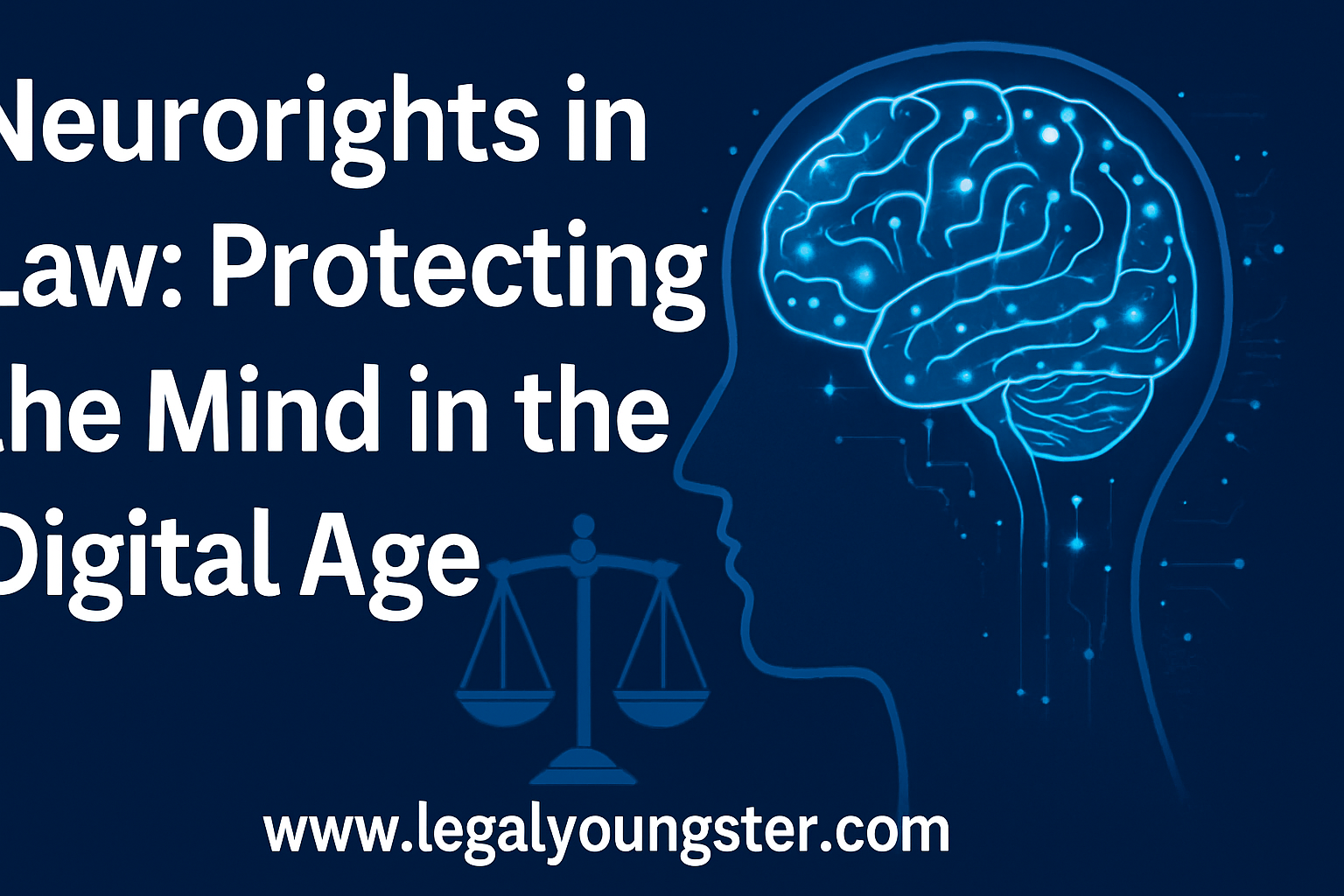



Author-Amay Yadav & Kanishka Sejwal
K.R. Mangalam University
Introduction
As neurotechnology advances, the ability to monitor, interpret, and manipulate brain activity raises profound ethical and legal questions. Neurorights—rights protecting cognitive liberty, mental privacy, and psychological autonomy—have emerged as a critical framework to address these challenges. This article explores the legal foundations of neurorights, their implications for law, and the need for robust frameworks to safeguard individuals in an era of brain-computer interfaces (BCIs), artificial intelligence (AI), and neural data analytics. It examines global policy trends, landmark legislations such as Chile’s neuroprotection law, and potential gaps in existing human rights protocols. Accompanied by infographics and supported by references, it aims to elucidate why neurorights are becoming a cornerstone of modern legal discourse and how proactive governance can ensure the ethical deployment of neurotechnologies.
The Rise of Neurotechnology and the Need for Neurorights
Neurotechnologies, such as BCIs, electroencephalography (EEG), and neural implants, have evolved from medical tools to consumer products. Companies like Neuralink and Kernel are developing devices that can record or modulate brain activity, enabling applications from treating neurological disorders to enhancing cognitive performance. However, these technologies also pose risks: unauthorized access to neural data, manipulation of thoughts, or discriminatory use of cognitive profiles.
Neurorights address these risks by advocating for:
Mental Privacy: Protection against unauthorized access to neural data, including from corporations, governments, or malicious actors.
Cognitive Liberty: The right to control one’s mental processes and decisions, preserving autonomy amid growing brain-computer interface capabilities.
Freedom from Neurodiscrimination: Preventing bias based on neural data in employment, education, or insurance contexts.
Mental Integrity: Safeguarding against unwanted alteration of brain activity, such as manipulation through neurostimulation or subliminal neural influence.
These principles are rooted in existing human rights frameworks but require adaptation to address the unique challenges of neurotechnology.
Legal Foundations and Current Frameworks
Historical Context
The concept of protecting the mind is not entirely new. Legal protections for autonomy and privacy can be traced to Enlightenment-era philosophies, such as John Locke’s emphasis on individual liberty and self-ownership. Thinkers like Immanuel Kant also argued for the inherent dignity and rational agency of the human being, laying early philosophical groundwork for mental autonomy. These ideas influenced foundational legal doctrines on consent, free will, and bodily integrity.
However, neurotechnology introduces novel challenges that traditional legal frameworks—focused on physical and informational privacy—are ill-equipped to handle. Unlike past concerns over external surveillance or bodily harm, neurotech directly engages with the internal cognitive domain—thoughts, emotions, intentions. This shift from observable behavior to inner mental states demands an evolution in legal theory. It necessitates new definitions of harm, consent, and autonomy that address the unique vulnerabilities of the brain in the digital age. Recognizing this, neurorights seek to modernize existing human rights in response to technological capabilities unimaginable even a few decades ago.
Emerging Legal Responses
Several jurisdictions have begun addressing neurorights:
Chile: In 2021, Chile became the first country to enshrine neurorights in its constitution, amending Article 19 to protect “brain activity” and “information derived from it.” The country also passed a Neuroprotection Law, setting a global precedent.
European Union: The EU’s General Data Protection Regulation (GDPR) indirectly covers neural data as “sensitive personal data,” but lacks specific provisions for neurotechnology. Proposals for an AI Act include considerations for neurotech governance.
United States: No federal neurorights legislation exists, but states like California have explored extending data privacy laws (e.g., CCPA) to neural data. Legal scholars advocate for a “Fifth Amendment” approach to protect against compelled neural data disclosure.
International Efforts
Balancing Freedom of Speech and Hate Speech in the Digital Age
The United Nations and organizations like the Neurorights Foundation are pushing for global standards to address the legal and ethical challenges posed by neurotechnology. The OECD’s 2019 Recommendation on Responsible Innovation in Neurotechnology calls for ethical governance, emphasizing transparency, informed consent, and human-centric design in neurotech development.
In 2021, Chile became the first country to enshrine neurorights in its constitution, setting a precedent for legislative action. Meanwhile, the Council of Europe and UNESCO have initiated dialogues on digital human rights that now increasingly include neural data and mental autonomy. Several academic and policy consortiums are also drafting frameworks for international neuro-rights treaties.
Efforts are underway to define core neurorights—such as mental privacy and cognitive liberty—as non-derogable rights, similar to protections against torture. This global momentum underscores a growing recognition that neural data, like genetic or biometric information, demands special legal status. Without coordinated international standards, there is a risk of uneven protections and regulatory loopholes, especially as tech companies and governments race to develop and deploy advanced brain-computer interfaces.
Challenges in Implementing Neurorights
Defining Neural Data: Neural data is complex, encompassing raw brain signals, derived insights, and behavioral predictions. Legally defining its scope is critical but challenging.
Consent and Autonomy: Obtaining informed consent for neural data use is complicated by the opaque nature of neurotech algorithms and potential subconscious manipulation.
Jurisdictional Variability: Differing legal standards across countries create gaps in protection, especially in globalized tech markets.
Balancing Innovation and Regulation: Overregulation may stifle neurotech advancements, while underregulation risks abuse.
The Core Neurorights Framework outlines emerging legal protections for the human brain, balancing innovation in neurotechnology with fundamental cognitive freedoms.
(Author’s Creation)
Case Studies
Chile’s Pioneering Legislation: Chile’s Neuroprotection Law mandates explicit consent for neural data collection and prohibits its commercial use without authorization. This has inspired countries like Brazil and Mexico to explore similar laws, signaling a regional shift toward safeguarding mental autonomy.
Neuralink’s Trials: Neuralink’s human trials, underway by 2025, highlight the need for neurorights. Without clear regulations, neural data from implants could be exploited for profit or surveillance, blurring lines between medical innovation and invasive monitoring. The lack of global standards raises ethical red flags.
Workplace Neurotech: Companies using EEG headsets to monitor employee focus raise concerns about neurodiscrimination and mental intrusion. In high-pressure industries, employees may feel coerced into allowing mental surveillance, undermining consent. Legal frameworks must ensure that workers’ mental privacy is respected and protected against misuse or performance-based profiling.
Future Directions
To address these challenges, legal systems must:
Develop Specific Legislation: Laws tailored to neural data, like Chile’s, should become global norms. Such legislation must define key neurorights, set clear boundaries for data use, and establish strong enforcement mechanisms.
Enhance Consent Mechanisms: Transparent, dynamic consent processes for neurotech use are essential. Users should have the ability to withdraw or modify consent at any time, with a clear understanding of how their neural data is being processed.
Foster International Cooperation: A UN-backed neurorights treaty could harmonize standards, prevent jurisdictional loopholes, and promote cross-border accountability.
Integrate with AI Governance: As neurotech and AI converge, unified regulatory frameworks are needed. Ethical oversight boards, interdisciplinary research, and AI-neurotech safety audits will be critical.
Additionally, public awareness and digital literacy around neurorights must be prioritized to ensure democratic participation in shaping neurotechnology’s future.
“Global Momentum for Neurorights: Countries worldwide are beginning to recognize and legislate protections for the human mind in the age of neurotechnology.”
(Author’s Contribution)
Conclusion
Neurorights represent a critical evolution in human rights law, addressing the unprecedented challenges posed by neurotechnology. By protecting mental privacy, cognitive liberty, and mental integrity, legal systems can ensure individuals retain autonomy in an increasingly connected world. As neurotech advances, proactive legislation, informed by ethical principles and international collaboration, will be essential to safeguard the mind.
In particular, the rise of brain-computer interfaces (BCIs), neural data collection, and AI-powered neuro-interventions demands a rethinking of traditional legal frameworks. Without clear protections, individuals may be vulnerable to surveillance, manipulation, or discrimination based on their neural activity. Therefore, neurorights aim not only to preserve human dignity but also to establish accountability in how emerging technologies interact with the brain.
By embedding neurorights into national constitutions and global agreements, we can foster a future where innovation respects the sanctity of thought and the freedom of the self.
References
Yuste, R., Goering, S., et al. (2021). “Four Ethical Priorities for Neurotechnologies and AI.” Nature, 551(7679), 159–163.
Chile Constitutional Amendment, Article 19 (2021). Retrieved from [official government source].
OECD (2019). Recommendation on Responsible Innovation in Neurotechnology. OECD Publishing.
Ienca, M., & Andorno, R. (2017). “Towards New Human Rights in the Age of Neuroscience.” Frontiers in Human Neuroscience, 11, 199.
Neurorights Foundation (2025). “Global Neurorights Initiative.” Retrieved from [neurorightsfoundation.org].
European Union (2016). General Data Protection Regulation (GDPR). Regulation (EU) 2016/679.
Farahany, N. A. (2023). The Battle for Your Brain: Defending the Right to Think Freely in the Age of Neurotechnology. St. Martin’s Press.
Goering, S., & Yuste, R. (2022). “Neurorights in Practice: From Theory to Policy.” Neuroethics, 15(2), 123–135.
Rainey, S., & Erden, Y. J. (2020). “Neurotechnology and Ethics: A Call for Preemptive Regulation.” Science and Engineering Ethics, 26(4), 1787–1800.
Müller, V. C. (2021). “Ethics of Artificial Intelligence and Brain-Computer Interfaces.” AI & Society, 36(2), 447–456.